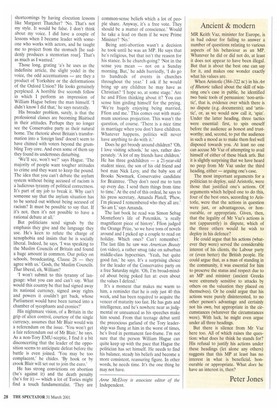Ancient & modern
MR Keith Vaz, minister for Europe, is in bad odour for failing to answer a number of questions relating to various aspects of his behaviour as an MP. Whatever he did or did not do, at least it does not appear to have been illegal. But that is about the best one can say for it, and makes one wonder exactly what his values are.
When Aristotle (384-322 Bc) in his Art of Rhetoric talked about the skill of winning one's case in public, he identified two basic tools of persuasion: 'non-artistic', that is, evidence over which there is no dispute (e.g. documents); and 'artistic', or, as we would now call it, 'spin'. Under the latter heading, three tactics were essential: first, to spin oneself before the audience as honest and trustworthy; and, second, to put the audience in such a mood as to make them feel well disposed towards you. At least no one can accuse Mr Vaz of attempting to avail himself of either of these black arts. But it is slightly surprising that we have heard no peep from Mr Vaz under the third heading, either — arguing one's case.
The most important arguments for a politician to deploy, said Aristotle, were those that justified one's actions. Of arguments which helped one to do this, four of the best ones, according to Aristotle, were that the actions in question were just, or advantageous, or honourable, or appropriate. Given, then, that the legality of Mr Vaz's actions is not (apparently) in dispute, which of the three others would he wish to deploy in his defence?
He could argue that his actions (whatever they were) served the considerable interest of his clients, the Labour party or (even better) the British people. He could argue that, as a man of standing in the community, it was essential for him to preserve the status and respect due to an MP and minister (ancient Greeks were extremely sensitive to attacks by others on the valuation they placed on themselves). Or he could argue that his actions were purely disinterested, to no other person's advantage and certainly not his own, but appropriate in the circumstances (whatever the circumstances were). With luck, he might even argue under all three headings.
But there is silence from Mr Vaz here too. All of which raises the question: what does he think he stands for? His refusal to justify his actions under these headings (let alone any others) suggests that this MP at least has no interest in what is beneficial, honourable or appropriate. What does he have an interest in, then?
Peter Jones


























































































 Previous page
Previous page